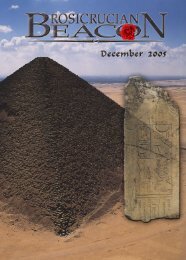contents - AMORC
contents - AMORC
contents - AMORC
Create successful ePaper yourself
Turn your PDF publications into a flip-book with our unique Google optimized e-Paper software.
The figure of Ahura Mazda, the “wise Lord,” sculpted onto a<br />
building in ancient Persepolis in modern day Iran.<br />
believe collectively constitute the divine creation.<br />
In myth, the Holy Immortals care for and protect<br />
their creations, and in the rituals, a token of<br />
each creation is present to represent the spiritual<br />
presence of that Holy Immortal.<br />
Asha, considered as the most beautiful<br />
of the Holy Immortals, represents not only the<br />
opposite of untruth, but also the divine law and<br />
moral order in the world. Asha preserves order on<br />
earth as he smites disease, death, fiends, sorcerers<br />
and all vile creatures. He is truth and cosmic<br />
order and is considered to be the closest of the<br />
Holy Immortals to God.<br />
Asha connotes the eternal, immutable<br />
law that governs the universe, and regulates<br />
both the spiritual and corporeal worlds. In<br />
Zoroastrianism, natural law and divine law<br />
are the same. Asha constitutes the yardstick<br />
for determining right and wrong. He<br />
sets normative ethics and provides the<br />
standards that apply to all people at all<br />
times. He represents absolute values. The<br />
assumption is that right deeds produce<br />
benefits alike for the author of the action<br />
and for society at large. The accruance of benefits<br />
to the author of the act is automatic. As with<br />
the law of Karma, the law of Asha ensures that<br />
happy consequences accrue to good acts. An<br />
individual reaps what he or she sows.<br />
Asha is Truth<br />
Asha means many related things, and can't be<br />
translated by just one English word. You need<br />
a whole constellation of words to translate it:<br />
righteousness, law, cosmic order, truth and<br />
justice. But Asha is first and foremost “Truth,” the<br />
opposite of the “Lie” (druj).<br />
The concept encompasses all clear and<br />
objective vision, all honesty and unclouded<br />
thoughts, words and deeds. Then it is<br />
The Rosicrucian Beacon -- September 2006<br />
“Righteousness,” which involves a commitment<br />
to good actions that build society and lead toward<br />
health, peace and good will. These actions are not<br />
prescribed, as they are in Jewish or Islamic sacred<br />
law, but they will vary as the conditions of history<br />
or society vary. The underlying call to right action<br />
however, remains the same.<br />
Asha is also “Law;” not a prescribed set<br />
of commandments, but a description of the laws<br />
that rule our lives and the universe around us.<br />
Asha is impersonal. In Zoroastrianism, Ahura<br />
Mazda is not the type of God who suspends<br />
the laws of reality in order to make a point<br />
or to help someone. In Zoroaster’s concept of<br />
divine governance, there are no suns standing<br />
still, miraculous healings, miraculous plagues<br />
or deliverances, no resurrections from the dead.<br />
In all the Gathas (Zoroastrian hymns), there are<br />
no miracles or supernatural occurrences; this is<br />
astonishing for something composed at least 3,500<br />
years ago. In Asha, God set up the laws of reality,<br />
both in the natural world and the social world;<br />
and he will not break them.<br />
The law of Asha describes what actually<br />
happens, not what should happen. It encompasses<br />
the law of gravity and all physical laws discoverable<br />
by science as well as the laws of consequences<br />
governing our own behaviour, which are<br />
discoverable by sometimes painful experience.<br />
Throw a rock in the air and, if unhindered in<br />
Asha represents not only the opposite of<br />
untruth, but also the divine law and moral<br />
order in the world.<br />
its descent, it will come down: that is Asha.<br />
Overindulge in alcohol one night and you will<br />
wake up with an unpleasant hangover; that is also<br />
Asha, the law of consequences. If you do wrong,<br />
quite often the world itself will punish you, either<br />
by its own laws, or by someone taking the law into<br />
their own hands. But what of those who do wrong<br />
and prosper, who die happily after a life of evil?<br />
Then we must look to the world to come, which<br />
is also under the rule of Asha, where, as Zoroaster<br />
states, the “Best Existence” (heaven) is waiting for<br />
those who choose good in this world, and where<br />
the “Worst Existence” (hell) is reserved for those<br />
who have done evil. This “hell” is not eternal,<br />
since all things will be purified by the end of time;<br />
but it is long enough to purify evildoers.<br />
27












